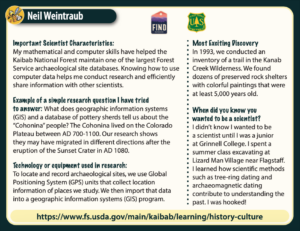Explore & Download All Collector Cards
Browse our ever-growing list of collector cards featuring a huge variety of careers in the Forest Service. Download and print collector cards and posters for free.

-


Tinelle Bustam, Educator and Social Scientist
Artemis Moon Trees
- Ph.D., University of Florida
- USDA Forest Service
- As an educator, I identify, design, and deliver opportunities for visitors to our national forests to strengthen and deepen their connections to the outdoors through education. With the Moon Trees project, I have the opportunity to educate people about our forests and outer space!
- Ph.D., University of Florida
- USDA Forest Service
- As an educator, I identify, design, and deliver opportunities for visitors to our national forests to strengthen and deepen their connections to the outdoors through education. With the Moon Trees project, I have the opportunity to educate people about our forests and outer space!
-


Grant Kirker, Research Technologist
Forests & PlantsScience Communication
- Ph.D., Mississippi State University
- USDA Forest Service Scientist
- Research technologists are responsible for planning, conducting, and analyzing scientific experiments as well as communicating results through peer-reviewed journals. My research interests relate to living and nonliving factors that cause wood to decay.
- Ph.D., Mississippi State University
- USDA Forest Service Scientist
- Research technologists are responsible for planning, conducting, and analyzing scientific experiments as well as communicating results through peer-reviewed journals. My research interests relate to living and nonliving factors that cause wood to decay.
-


Paul Gobster, Research Landscape Architect
Forests & Plants
- Ph.D., University of Wisconsin-Madison
- USDA Forest Service Scientist
- A landscape architect studies how the design, planning, and management of landscapes can provide a more harmonious fit between people and their environment.
- Ph.D., University of Wisconsin-Madison
- USDA Forest Service Scientist
- A landscape architect studies how the design, planning, and management of landscapes can provide a more harmonious fit between people and their environment.
-


Brett J. Butler, Research Forester
Forests & Plants
- Ph.D., Oregon State University
- USDA Forest Service Scientist
- A research forester is a scientist who studies the patterns and processes impacting forests. My work focuses on the human dimensions of forests and specifically the people and organizations who own and manage forest.
- Ph.D., Oregon State University
- USDA Forest Service Scientist
- A research forester is a scientist who studies the patterns and processes impacting forests. My work focuses on the human dimensions of forests and specifically the people and organizations who own and manage forest.
-


Daniel R. Williams, Environmental Social Scientist

- Ph.D., University of Minnesota
- USDA Forest Service Scientist
- Environmental social scientists study a wide variety of topics involving people, society, and their interactions with the environment. My work focuses on how people experience and value nature in their everyday lives.
- Ph.D., University of Minnesota
- USDA Forest Service Scientist
- Environmental social scientists study a wide variety of topics involving people, society, and their interactions with the environment. My work focuses on how people experience and value nature in their everyday lives.
-


Sarah Wiener, Social Scientist
Science Communication
- M.S., North Carolina State University
- USDA Forest Service Scientist
- As a social scientist, I study the ways that landowners and natural resources specialists interact with scientific information. I help scientists and tool developers improve their communications and products.
- M.S., North Carolina State University
- USDA Forest Service Scientist
- As a social scientist, I study the ways that landowners and natural resources specialists interact with scientific information. I help scientists and tool developers improve their communications and products.
-


Neil Weintraub, Archaeologist

- B.A., Grinnell College
- USDA Forest Service Scientist
- As an archaeologist, I work with partners, volunteers, and tribes to survey, record, protect, interpret, and preserve places where people once lived.
- B.A., Grinnell College
- USDA Forest Service Scientist
- As an archaeologist, I work with partners, volunteers, and tribes to survey, record, protect, interpret, and preserve places where people once lived.
-


David Wear, Resource Economist & Computer Modeler

- Ph.D., University of Montana
- USDA Forest Service Scientist
- As a resource economist and computer modeler, I study how people choose to use and manage forests and natural resources. This enables us to predict how people may use those resources in the future.
- Ph.D., University of Montana
- USDA Forest Service Scientist
- As a resource economist and computer modeler, I study how people choose to use and manage forests and natural resources. This enables us to predict how people may use those resources in the future.
-


Travis Warziniack, Environmental Economist

- Ph.D., University of Wyoming
- USDA Forest Service Scientist
- Environmental economists study the way people interact with nature. This research includes how people value nature, how they respond to changes in the environment, and what policies can be used to protect the environment.
- Ph.D., University of Wyoming
- USDA Forest Service Scientist
- Environmental economists study the way people interact with nature. This research includes how people value nature, how they respond to changes in the environment, and what policies can be used to protect the environment.
-


Dr. Erika S. Svendsen, Social Scientist

- Ph.D., Columbia University
- USDA Forest Service Scientist
- A social scientist studies people including individuals, groups, and organizations.
- Ph.D., Columbia University
- USDA Forest Service Scientist
- A social scientist studies people including individuals, groups, and organizations.















